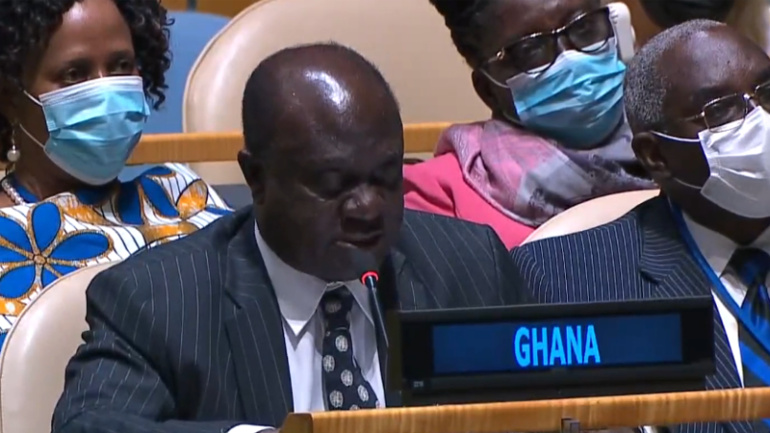High-level Political Forum: Building back better and advancing the SDGs

- Posted by admin
- Posted in Statement & Remarks
Excellencies
Distinguished Delegates,
Ladies and gentlemen,
It is a distinct honour and privilege for me to join you all today for this important and timely townhall meeting on “Building back better and advancing the SDGs”. I think there is consensus in this room that we are at a crossroad in our journey towards Agenda 2030 and in our recovery from the negative socioeconomic impacts of the COVID-19 pandemic. We also agree that global efforts to meet the 2030 Sustainable Development Goals are off target and that commitments required to help countries correct course are coming up short. Efforts by developing countries at building back better from the ravages of the pandemic have been severely undermined by the lack of access to vaccines and financial resources, and in recent months, by the rising geopolitical tensions which are impacting commodity prices and raising financial market volatility. Undoubtedly, these global headwinds and uncertainties have made the quest to build back better and achieve the SDGs more daunting. They, however, cannot and should
not deflate our efforts. Rather, this is the time to be progressive, be pragmatic and act swiftly.
I want to highlight a few areas that require a progressive and innovative approach towards building back better and advancing the SDGs. How can we address the food security situation, including by building on the outcomes of the Secretary-General’s Food System Summit? A global food crisis, triggered by the COVID-19 pandemic and its supply-chain impacts, is being aggravated and exacerbated by the on-going war in Ukraine. The ramifications indeed go beyond our food systems. Entire economies have been disrupted, with millions and millions experiencing severe economic hardships, under conditions that threaten the stability of national life. The need for urgent and bold
international action, both to respond to the humanitarian disaster unfolding in parts of Africa, and to build resilience for the future, has never been more critical.
My delegation therefore:
• Calls for a global plan that ensures a well-sequenced, timely, systematic and comprehensive response to the crisis we face. That plan should support the implementation of the African Common Position for Sustainable Food Systems; address the $1.5 billion Africa Emergency Food Production Plan; and deepen support for existing initiatives that have shown great promise.
• The global plan should also serve as a global bulwark in diversifying risks in initiatives similar to the West African Food Security Storage Systems.
• Urges the need to seriously tackle the urgent and pressing task of building the resilience of vulnerable communities in West Africa and the Sahel against drought and desertification in order to mitigate and reverse the debilitating effect of climate change on food production and air quality.
• Calls on the international humanitarian community to become part of national and regional coordination mechanisms for programming and responding to humanitarian crises, and to align their interventions with national and regional response plans. The Community is encouraged to make full use of endogenous mechanisms to facilitate the expansion of local, national and regional reserves.
What policies, measures and innovations have emerged during the pandemic that hold promise for inclusive and sustainable recovery and how can they be scaled up
Locally in Ghana, the Fintech industry has grown significantly because lockdowns caused a significant number of businesses to go online. It is estimated that as much as 79% of retail business was conducted online during the lockdown period, and the value of mobile money transactions stood at US$99bn, exceeding cheque and cash transactions valued at US$29 billion in 2020. According to Bloomberg, Global Environmental Social and Governance (ESG) assets are on track to exceed US$53 trillion by 2025.Sustainability-linked loans and bonds have also turned out to be the fastest-growing category of sustainable debt and accounted for more than US$530 billion in issuances in 2021. Having already developed and published a Sustainable Financing Framework to enable us to direct more sustainable investments towards implementing the SDGs in Ghana, we are greatly encouraged by these investment trends, and potential asset swaps and monetization of our natural resources such as carbon credits. We are confident and excited that our ongoing efforts towards accessing sustainable and innovative financing over the medium term will enable us to meet the ambitious 2030 goals.
Conclusion
For those of us from Africa, the SDGs are our compass for bolstering Africa’s longterm recovery from negative impacts of the COVID-pandemic. Sadly, this compass, has since 2020 been at a standstill and in some cases has flipped – pointing in the wrong direction. We therefore need bold, coordinated and urgent global action to
address this stagnation/reversal through sustainable and innovative financing. These actions should start with addressing the food, energy and liquidity crisis currently confronting most African economies. Doing this will create a foundation upon which African countries can build back better.
Thank you.
